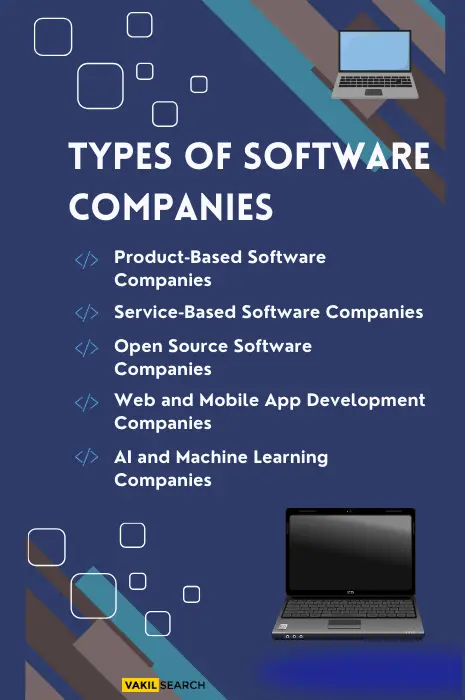In this article we will take a look at what are the various aspects involved in the process of incorporating a software company in India.
What is a Software Company?
A software company is an organization that specializes in the development, sale, and maintenance of software products and services. These companies create software solutions for various purposes, including business applications, mobile apps, web development, and more. Software companies play a crucial role in the technology industry, driving innovation and providing solutions to meet diverse user needs.
Different categories to register a Software Company in India
When registering a software company in India, you can choose from various legal structures, such as:
- Private Limited Company
- Limited Liability Partnership (LLP)
- Sole Proprietorship
- Partnership Firm
- One Person Company (OPC)
The choice of structure depends on factors like ownership, liability, and regulatory compliance.
Types Of Software Companies In India

Software companies in India can fall into various categories based on their focus and specialization:
- Product-Based Software Companies: These companies develop and market software products for specific industries or general use. Examples include Microsoft, Adobe, and Oracle.
- Service-Based Software Companies: Service-oriented software companies offer custom software development, IT consulting, and outsourcing services. They cater to client-specific requirements.
- Open Source Software Companies: These companies contribute to open-source software development and provide support, customisation, and consulting services for open-source software products.
- Web and Mobile App Development Companies: Specialise in creating web and mobile applications, including e-commerce platforms, social media apps, and more.
- AI and Machine Learning Companies: Focus on artificial intelligence (AI) and machine learning solutions, including natural language processing, computer vision, and data analytics.
Services provided by a Software Business in India
Software businesses in India offer a wide range of services, including:
- Software Development: Creating custom software solutions for businesses and individuals.
- Mobile App Development: Designing and developing mobile applications for various platforms.
- Web Development: Building websites, web applications, and e-commerce platforms.
- Cloud Computing: Offering cloud-based solutions, including storage, computing, and hosting services.
- AI and Machine Learning: Developing AI-powered applications, predictive analytics, and machine learning models.
- Software Testing and Quality Assurance: Ensuring software products meet quality and performance standards.
- IT Consulting: Providing expertise in IT strategy, infrastructure, and technology adoption.
Documents Required to Start a Software Company in India
To make a PVT Limited company registration as software company in India, you typically need documents such as:
- Memorandum of Association (MOA) and Articles of Association (AOA)
- PAN Card
- TAN (Tax Deduction and Collection Account Number)
- Digital Signature Certificate (DSC)
- Company Incorporation Certificate
- GST Registration Certificate
- Bank Account Documents
- Address Proof
- Board Resolution
- Shareholder and Director Details
What Is the Legal Procedure to Start a Software Company?
The legal procedure to start a software company in India involves the following steps:
- Choose a Business Structure: Decide on the legal structure (e.g., Private Limited Company, LLP) and register the business entity.
- Name Reservation: Reserve a unique name for your company.
- Obtain Digital Signatures: Directors and authorised signatories must obtain digital signature certificates (DSC).
- Apply for Director Identification Number (DIN): Directors need DINs, which are obtained through the Ministry of Corporate Affairs (MCA).
- Draft MOA and AOA: Prepare the Memorandum of Association (MOA) and Articles of Association (AOA) for your company.
- File for Incorporation: Submit the necessary documents and forms to the Registrar of Companies (ROC) for company incorporation.
- Get PAN and TAN: Apply for Permanent Account Number (PAN) and TAN for tax purposes.
- GST Registration: Register for Goods and Services Tax (GST) if your annual turnover exceeds the threshold.
- Open Bank Account: Open a business bank account to manage finances.
- Compliance and Ongoing Filings: Comply with annual filing and regulatory requirements as per the business structure.

Considerations Before Setting Up a Software Company
Before establishing a software company, consider factors such as market research, target audience, competition analysis, business plan, financial projections, and funding requirements.
How To Raise Funds For Software Company In India?
Methods to raise funds for a software company in India include bootstrapping, angel investors, venture capital, bank loans, crowdfunding, and government schemes. The choice depends on the stage and financial needs of your business.
How To Register A Software Company In India?
To make a company registration of software company in India, follow these steps:
- Choose a suitable legal structure.
- Reserve a unique name for your company.
- Obtain digital signature certificates (DSC) for directors.
- Apply for a Director Identification Number (DIN).
- Draft the Memorandum of Association (MOA) and Articles of Association (AOA).
- File for company incorporation with the Registrar of Companies (ROC).
Obtain PAN and TAN
- Register for GST if required.
- Open a business bank account.
- Comply with ongoing regulatory and tax requirements.
Software Company FAQs
How much does it cost to start a software company?
The cost of starting a software company can vary widely depending on various factors, including the type of software you intend to develop, your location, the scale of your operation, and your business model. Here are some common expenses to consider:
- Office Space and Utilities: If you plan to have a physical office.
- Equipment and Technology: Computers, software licenses, servers, and development tools.
- Salaries and Wages: For developers, designers, testers, and other staff.
- Marketing and Sales: Promoting your software, website development, and advertising.
- Legal and Regulatory Costs: Including business registration and compliance.
- Intellectual Property Protection: Patent or copyright filings, if applicable.
- Operational Expenses: Such as internet and phone bills, insurance, and licenses.
- Research and Development: Costs associated with creating and improving your software product.
The initial capital required can range from a few thousand dollars for a small startup operating from home to millions of dollars for a larger software company with an office, extensive development needs, and marketing efforts.
Can I start an IT company without coding knowledge?
Yes, you can start an IT company without coding knowledge, especially if you have other valuable skills or expertise in areas such as project management, business analysis, marketing, sales, or finance. However, having a basic understanding of software development concepts and technology trends can be beneficial for effective communication and decision-making within the company. You can also consider partnering with technical co-founders or hiring developers to handle the coding aspect.
What is the Rule of 40?
The Rule of 40 is often used in the software industry as a metric to evaluate the health and growth of a software company, particularly SaaS (Software as a Service) companies. It suggests that the sum of a company's growth rate and profit margin should be equal to or greater than 40%. In other words:
(Growth Rate %) + (Profit Margin %) ≥ 40 For example, if a company is growing at a rate of 30% annually, it should have a profit margin of at least 10% to meet the Rule of 40. This metric helps assess if a company is achieving a healthy balance between growth and profitability.
What is the maximum salary of a software engineer?
The maximum salary of a software engineer can vary significantly based on factors such as location, experience, expertise, and the specific company or organisation. In some high-demand tech hubs like Silicon Valley in the United States, senior software engineers at top tech companies can earn salaries well into the six-figure range, sometimes exceeding $200,000 or more per year. However, it's important to note that salary ranges can vary widely by region and market conditions. Additionally, compensation packages often include bonuses, stock options, and other benefits, which can significantly impact a software engineer's total earnings.

